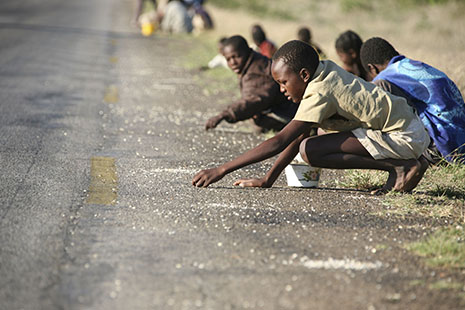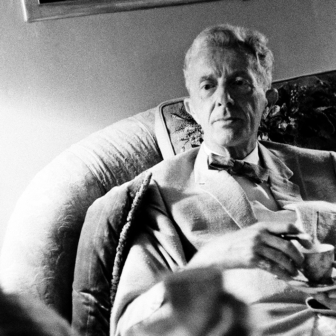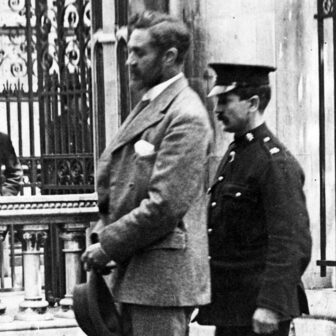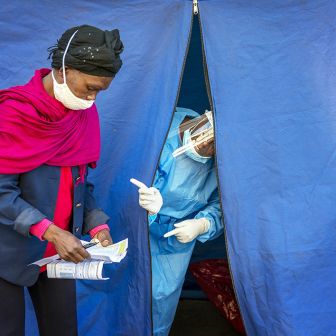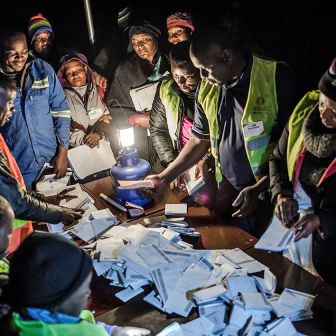AMID THE SEVERE cholera outbreak, I visited my cousin late last month in the sprawling high-density suburb of Chitungwiza, thirty kilometres out of Harare. Even though I had been taking precautions to avoid cholera, I badly wanted to see my cousin and so I brushed aside the increased risk of being exposed to the disease.
Zimbabwe’s recent cholera outbreak is the worst in the country’s history. It has claimed nearly 2500 lives and affected over 30,000 people. To make matters worse, the government of Zimbabwe has described the outbreak as a “genocidal onslaught on the people of Zimbabwe by the British.” It has done little to ensure an effective response to the disease and has covered up the extent of the epidemic.
I found myself skipping over the raw sewage flowing in a trench outside my cousin’s house, amid a stench that filled the atmosphere. I wasn’t really surprised by the flow of sewage – after all, to get to my cousin’s house I had skipped over many other streams of thick grey water – and no one else seemed to care about the sewage as they went about their daily business. In Chitungwiza, as in many other parts of Zimbabwe, the sewerage and water supply systems have collapsed, putting the entire population at risk of cholera. Uncollected garbage has become the norm and people have taken to using makeshift dumping sites.
My cousin offered me some food, which I couldn’t refuse in spite of the green flies that buzzed everywhere around his house. To refuse food when you have visited a relative is an unforgivable and uncultural act in my country. So with thoughts of cholera at the back of my mind, I munched away.
By the time I left his house my stomach was rumbling. I caught a ride to town and paid the fare in American dollars. Paying for services in American dollars is another thing that has become the norm in Zimbabwe. All the while I clutched my rumbling stomach, trying to calm it and fearing for the worst. As my intestines wriggled about like garden worms, I grew more fearful of the killer pathogen with every minute that passed.
I knew that going to the local hospital, about three kilometres away from my house, was probably a waste of time. To test my luck I visited it anyway; it was empty except for an old nurse sitting at the front desk. Many of the public hospitals in Zimbabwe have closed down, denying the population access to an essential service. In recent years Zimbabwe has lost highly experienced health professionals to neighbouring countries such as South Africa, Botswana, New Zealand, the United Kingdom and Australia. Not much has been done by the Mugabe regime to stem this hemorrhage of human resources. Throughout the years of crisis, members of the ruling class have maintained a state of arrogance because they can easily get access to foreign health services while they preside over a dying population.
The old nurse told me that there were no cholera vaccinations and that I had to go home and make a sugar and salt solution so that my body could rehydrate. I left the hospital frustrated and angry. But there was little that I could do. After all, if you speak out about the state of affairs in this country, you risk losing your life. I have heard stories of people being abducted during the night, never to be seen again, because they dared to speak out about corruption and misgovernance.
In desperation, I told a friend about my stomach problems and he offered to share with me his stock of pills. He had also recently experienced stomach problems and he suggested that the pills could help me. I thanked him for his concern but refuse the offer. I knew that sharing drugs was the risky way that many people were using to cope with diseases. Other people have taken to consulting traditional healers or using more easily accessible herbal medical medication. Local pharmacies and private doctors now charge for services in American dollars, which are out of reach for many people.
With the rumble in my stomach refusing to go away, I found myself in a quandary. I was prepared for whatever God had in store for me. That’s the way many people in my country have become: resigned to our fate. Death is something always looming over us. Not only are we dying from man-made causes but our leaders are prepared to kill in order to maintain a stranglehold on power. I am not even sure whether the water I drink daily is cholera free. Obviously, I boil it to kill the cholera pathogens. But, in reality, it is only by God’s grace that I have managed to survive cholera in Zimbabwe so far. •
